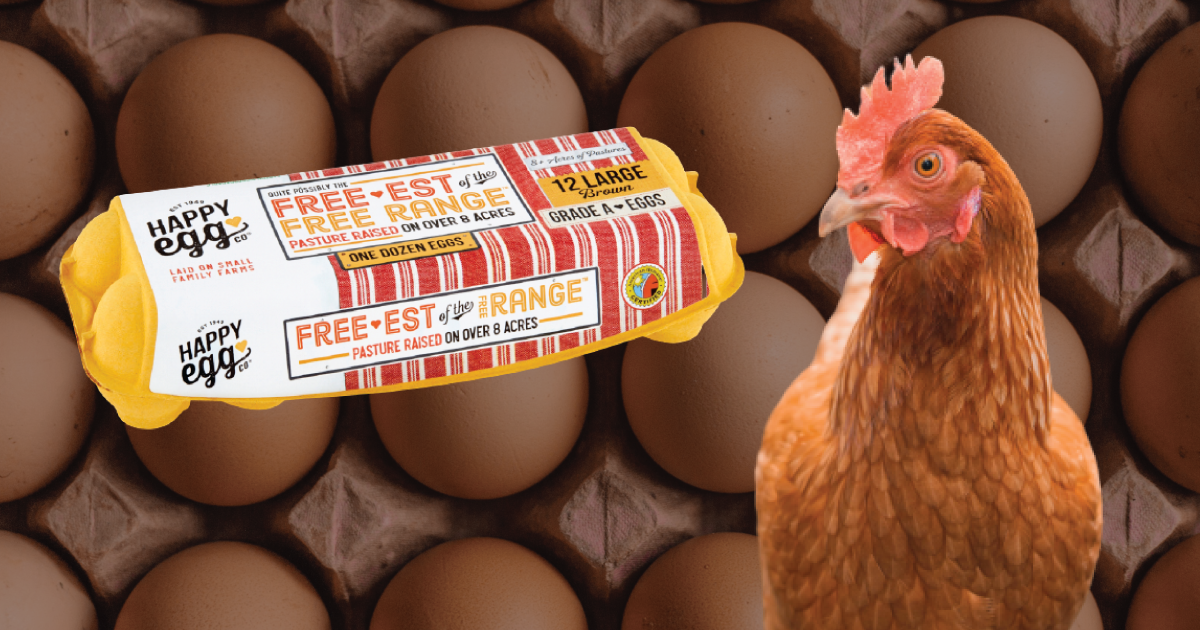
‘Happy’ Eggs from ‘Happy’ Hens? Here’s what Happy Egg Co. Really Believes
October 7, 2020 | Katherine Paul
Organic Consumers Association
One look at the Happy Egg Co. website, and any reasonable consumer would think, wow, this company really cares about the welfare of the hens that produce the “happy eggs” it sells to consumers.
On one page, the company says:
“Freedom is key to being a happy, healthy hen. So we happily uphold the Five Freedoms of Animal Welfare, globally recognized as the key elements of animal welfare humans can control.”
On another Happy Egg webpage, consumers read that “Everybody’s Happy”:
“We all make choices in life. At the Happy Egg Co, we choose to make ours maximize health and happiness. We know happy farmers make for happy hens. Happy hens lay happy, healthy eggs. And Happy Eggs make everybody happy. Not to mention healthy.”
That’s a lot of happiness. So imagine our surprise when we sued Happy Egg for false and deceptive marketing, only to learn from the company’s attorneys that Happy Egg doesn’t believe that its own animal welfare marketing claims—at least not the claims it makes on its egg cartons—should have to be verified or regulated.
In fact, Happy Egg maintains that cities and states should be completely prohibited from regulating animal welfare marketing claims on egg products, because the company complies with federal egg labeling standards. The problem, of course, is that Happy Egg also argues that “there is no federal standard defining ‘pasture raised.’”
In other words, according to Happy Egg, the federal government doesn’t regulate animal welfare claims on egg products, and state and local governments shouldn’t be allowed to do so either.
At least, that’s the position the company’s attorneys took when they argued that our lawsuit should be dismissed. The court rejected the arguments laid out in Happy Egg’s motion to dismiss, so the lawsuit will move forward.
But we thought consumers might want to know how the legal minds at Happy Egg view animal welfare claims—regardless of what the company tells you, the consumer, about how deeply it cares about the hens that produce such “happy” eggs.
In March, Organic Consumers Association sued Happy Egg Co. for false, deceptive and misleading advertising claims. Here’s why. As stated on the company website, Happy Eggs are certified “Free-Range” by the American Humane Association (AHA). What does that mean?
AHA independently certifies eggs according to three classifications, spelled out here on the AHA website. Those classifications (as defined by AHA and other major certifiers) ranging from lowest animal welfare standards to highest, are: Cage Free, Free-Range and Pasture Raised. AHA has independently certified Happy Eggs as “Free-Range.” Yet throughout the website, and on the brand’s egg cartons, the company also states that its hens are “Pasture Raised on Over 8 Acres.”
What’s wrong with that statement? Consumers seeking eggs that meet animal welfare standards certified by third partiesare confused—and even misled—when a brand that claims to meet AHA’s lower “Free-Range” standard, also claims to be “Pasture Raised,” even though the eggs don’t meet the higher “pasture raised” standard as defined by AHA.
In fact, the Happy Eggs brand doesn’t meet AHA’s “Pasture Raised” standard of “108.9 square feet per hen of outdoor area during the daytime.” AHA says the brand’s eggs meet only its lower, “daytime access to an outdoor area of at least 21.8 square feet per hen” “Free-Range” standard.
So, what about Happy Egg’s claim that its hens are “Pasture Raised on Over 8 Acres?”
That statement tells you only that the hens are raised on over 8 acres—not how many hens are raised on those 8 acres at any one time. Are there 100 hens on 8 acres? 1,000? 10,000? 100,000? The statement, which appears directly under the “Free-Range” claim on the carton, leaves out the most important information: how many hens per acre?
Misleading? We thought so, hence the lawsuit.
To be clear, there is no regulatory definition of “Pasture Raised.” Organizations like AHA fill that gap by providing independent animal welfare certification. Consumers who want to know how a brand’s eggs are produced, including how the egg-laying hens are treated, rely on those certifications. Not all certification programs are identical—here’s a list of animal welfare certifiers for eggs.
As we stated in our complaint against Happy Egg, it’s an established fact that a growing number of consumers are concerned about—and are basing their buying decisions on—issues related to sustainability, nutrition and animal welfare.
In fact, animal welfare concerns consistently rank at or near the top of concerns among food consumers. Companies, including Happy Egg, know this. They shouldn’t be allowed to exploit those concerns by making ambiguous or misleading claims about their animal welfare practices.
As a conscious consumer, you’ve already got your work cut out for you when it comes to making sense of all the certifications and marketing and labeling claims floating around on egg cartons and egg brands’ websites.
You shouldn’t have to also worry about whether egg brands are playing fast and loose with those claims.
For more on how to buy certified organic eggs, check out this “Scrambled Eggs” report from Cornucopia Institute, or use Cornucopia’s egg scorecard.
Katherine Paul is associate director of the Organic Consumers Association (OCA). To keep up with OCA news and alerts, sign up for our newsletter.
